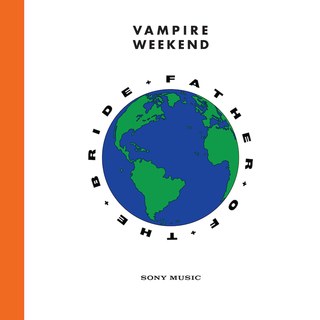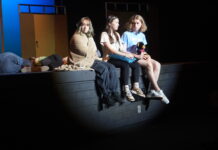
Rostam Batmanglij announced he was leaving the band Vampire Weekend to work on his own music and produce other artists records at the beginning of 2016.
The news shocked many fans, and some questioned whether the band was going to break up.
However, following the announcement, Batmanglij wrote on his social media, “Ezra [Koenig] and I will continue to work on future projects and Vampire Weekend songs.”
Three years later, Vampire Weekend released its fourth album Father of the Bride, on May 3, on Columbia Records.
The double-album includes 18 tracks, three featuring singer Danielle Haim, two featuring Steve Lacy and a few songs produced by ex-member Batmanglij.
The record opens with frontman Koenig and Haim singing the acoustic duet “Hold You Now.” They sing verses back and forth with each verse broken up by a sample of a Melanesian choral song from the war film The Thin Red Line. The three duets on the album recall the sounds of classic country hits but also add their own flare with Chris Tomson’s booming, driving bass drum, which pushes the songs forward.
The album experiments with iPhone recordings, samples from old movies, vocal effects, natural recordings of the environment and tempo changes. The album feels personal, almost like listeners are being thrown into the life of lead singer Koenig.
While the album lacks upbeat hits like “A-punk,” “Holiday,” “Cousins” and “Diane Young” featured on previous albums, the track “Bambina” has a playful feel to it and catchy Paul Simon-like choruses are present on the singles “This Life” and “Harmony Hall.”
The band’s new project is unlike any album members have put out in the past. The album deals with topics including rebirth, shedding old skin and even Koenig’s relationships and politics.
On Father of the Bride, Koenig depends less on a concept and Vampire Weekend’s preppy image as on previous albums. His jam-band influences, such as Phish and the Grateful Dead, have made an impact on the record and the band’s live performances. Members have switched from their usual twee pop and chamber pop sound and experimented with new sounds and ideas.
On one of the standout tracks, “How Long,” Chris Baio, the band’s bass player, starts a heavy bass line with Koenig singing the verse and chorus. The song builds with a new sound added or dropped during each part of the track.
On a recent episode of Time Crisis, Koenig’s bi-weekly radio show on Beats 1, he said, “I never put out anything I don’t love or think will be somebody’s favorite song at one point.”
The second half of the record starts off with the second duet between Haim and Koenig, “Married in the Gold Rush,” followed by the experimental songs “My Mistake” and “Sympathy.”
“Sunflower,” which features the artist Steve Lacy, is a strong song on the second half of the album. The melody is sung by Lacy, highlighted by fun and upbeat guitars shimmering throughout the track. It is a joy-filled experience encouraging listeners to let loose and have a great time. Koenig sings the verses, which are equally infectious. He blasts the word “sunflower” and is able to hook the listener right away.
Although the record is filled with some great summer songs, it takes from too many places, making some ideas feel incomplete. Each album prior had a set sound: Vampire Weekend was influenced twee pop, Contra by electro-pop and Modern Vampires of the City by chamber pop. Father of the Bride, on the other hand, is hard to pin down as the band dabbles in country, jam-rock, psych-rock, electro-pop and more.
Overall, the new album is an ambitious take in a new direction for the band as members try to fill in the gaps Batmanglij’s departure left. The album has many standout tracks but also a few that fall flat or seem unfinished.
The album deservedly debuted at number one on the Billboard 200 the week it was released.











